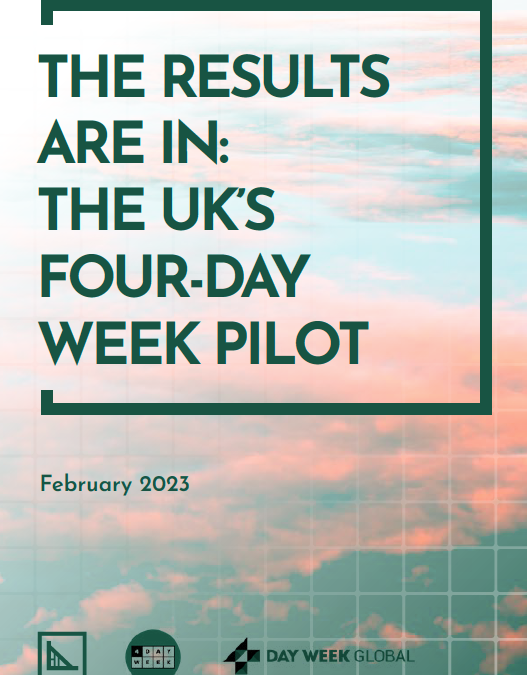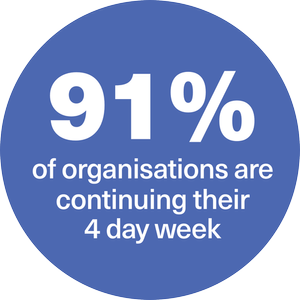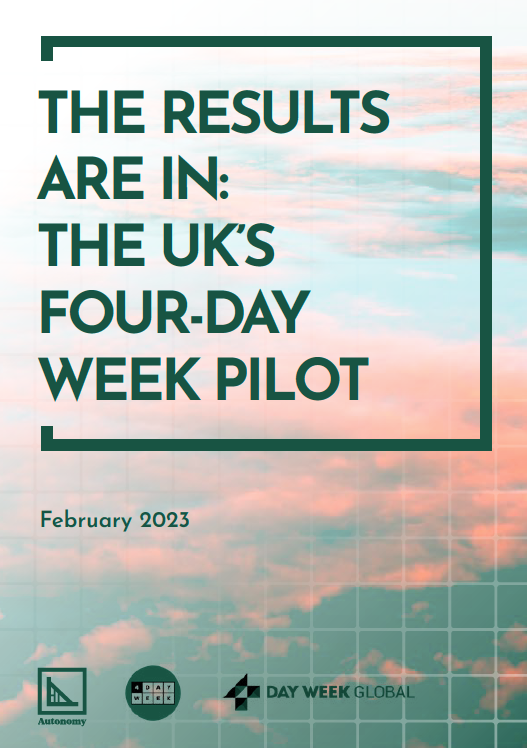Results from world’s largest 4-day workweek trial show 91% of organizations plan to continue

Image courtesy of 4 Day a Week Global
New research revealed that results from the world’s largest trial of a 4-day week are largely consistent with existing global evidence, further demonstrating the benefits of reduced-hour, output-focused working.
The pilot program — conducted in the UK by nonprofit 4 Day Week Global, the UK’s 4 Day Week Campaign and think-tank Autonomy — guided over 60 companies and almost 3,000 workers through a six-month trial of a 4 day week, with no loss of pay for workers. This brings the global campaign’s total number of completed pilot participants to 91 companies and approximately 3,500 employees.
Overall results show that almost every organization will stick to a 4-day week post-trial, with 91% definitely continuing or planning to continue, and a further 4% leaning towards continuing. Only 4% of participants are definitely not continuing.
Companies rated their overall experience of the trials an average of 8.5/10, with business productivity and business performance each scoring 7.5/10. Revenue rose by 35% over the trial periods when compared to similar periods from the previous year, and hiring increased while absenteeism decreased.

The health and well-being of employees also improved, with significant increases observed in physical and mental health, time spent exercising, and overall life and job satisfaction. Rates of stress, burnout and fatigue all fell, while problems with sleep declined.
Environmental outcomes were also encouraging, with commuting time falling across the full sample by a half hour per week.
Lead researcher Professor Juliet Schor of Boston College observed an encouraging consistency in the data:
Results are largely steady across workplaces of varying sizes, demonstrating this is an innovation which works for many types of organizations.
There are also some interesting differences. We found that employees in nonprofits and professional services had a larger average increase in time spent exercizing, while those in construction/manufacturing enjoyed the largest reductions in burnout and sleep problems.
Behavioral scientist and new CEO of 4 Day Week Global Dr Dale Whelehan explained the sample produced interesting differences in gender outcomes:
While both men and women benefit from a 4 day week, women’s experience is generally better. This is the case for burnout, life and job satisfaction, mental health and reduced commuting time. Encouragingly, the burden of non-work duties appears to be balancing out, with more men taking on a greater share of housework and childcare.
Co-founder and Managing Director of 4 Day Week Global Charlotte Lockhart looked to what’s ahead:
Our team is delighted to be expanding the arguments in favor of a 4-day week today with this new world-class academic research, and we look forward to adding our Australasian pilot results to this data set in the coming weeks and our European, South African, Brazilian and North American results in the coming months.
Find out more about the 4-day workweek trial here.

